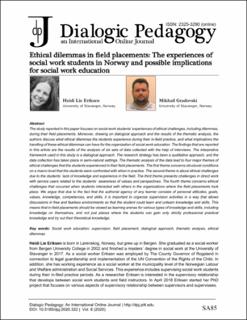| dc.contributor.author | Eriksen, Heidi Lie | |
| dc.contributor.author | Gradovski, Mikhail | |
| dc.date.accessioned | 2021-04-22T11:58:19Z | |
| dc.date.available | 2021-04-22T11:58:19Z | |
| dc.date.created | 2020-10-27T09:17:45Z | |
| dc.date.issued | 2020-10 | |
| dc.identifier.citation | Eriksen, H.L., Gradovski, M. (2020) Ethical dilemmas in field placements: The experiences of social work students in Norway and possible implications for social work education. Dialogic Pedagogy: An International Online Journal, 8. | en_US |
| dc.identifier.issn | 2325-3290 | |
| dc.identifier.uri | https://hdl.handle.net/11250/2739146 | |
| dc.description.abstract | The study reported in this paper focuses on social work students’ experiences of ethical challenges, including dilemmas, during their field placements. Moreover, drawing on dialogical approach and the results of the thematic analysis, the authors discuss what ethical dilemmas the students experience during their in-field practice, and what implications the handling of these ethical dilemmas can have for the organization of social work education. The findings that are reported in this article are the results of the analysis of six sets of data collected with the help of interviews. The interpretive framework used in this study is a dialogical approach. The research strategy has been a qualitative approach, and the data collection has taken place in semi-natural settings. The thematic analysis of the data lead to four major themes of ethical challenges that the students experienced in their field placements. The first theme concerns structural conditions on a macro level that the students were confronted with when in practice. The second theme is about ethical challenges due to the students´ lack of knowledge and experience in the field. The third theme presents challenges in direct work with service users related to the students´ awareness of values and perspectives. The fourth theme concerns ethical challenges that occurred when students interacted with others in the organizations where the field placements took place. We argue that due to the fact that the authorial agency of any learner consists of personal attitudes, goals, values, knowledge, competences, and skills, it is important to organize supervision activities in a way that allows discussions in free and fearless environments so that the student could learn and unlearn knowledge and skills. This means that in-field placements should be viewed as learning arenas for various types of knowledge and skills, including knowledge on themselves, and not just places where the students can gain only strictly professional practical knowledge and try out their theoretical knowledge. | en_US |
| dc.language.iso | eng | en_US |
| dc.publisher | University of Pittsburgh | en_US |
| dc.rights | Navngivelse 4.0 Internasjonal | * |
| dc.rights.uri | http://creativecommons.org/licenses/by/4.0/deed.no | * |
| dc.subject | sosialt arbeid | en_US |
| dc.subject | etiske dilemma | en_US |
| dc.subject | høyere utdanning | en_US |
| dc.subject | studenter | en_US |
| dc.subject | feltarbeid | en_US |
| dc.title | Ethical dilemmas in field placements: The experiences of social work students in Norway and possible implications for social work education | en_US |
| dc.type | Peer reviewed | en_US |
| dc.type | Journal article | en_US |
| dc.description.version | publishedVersion | en_US |
| dc.rights.holder | © authors | en_US |
| dc.subject.nsi | VDP::Samfunnsvitenskap: 200::Sosialt arbeid: 360 | en_US |
| dc.source.pagenumber | 27 | en_US |
| dc.source.volume | 8 | en_US |
| dc.source.journal | Dialogic Pedagogy: An International Online Journal | en_US |
| dc.identifier.doi | 10.5195/dpj.2020.322 | |
| dc.identifier.cristin | 1842504 | |
| cristin.ispublished | true | |
| cristin.fulltext | original | |
| cristin.qualitycode | 1 | |

